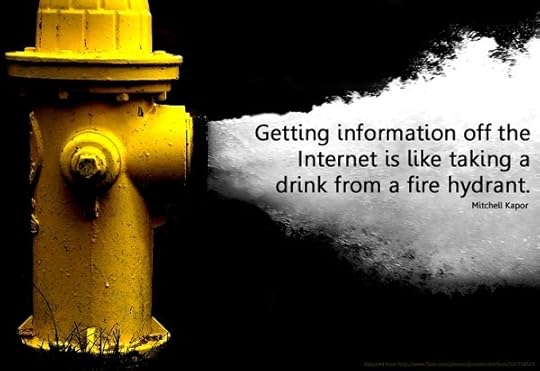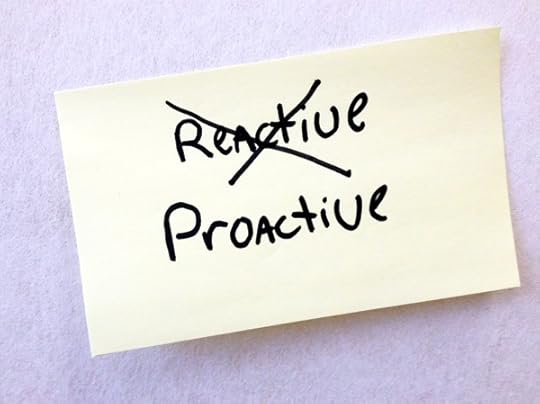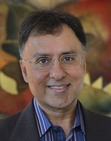The Subtle Shift of Mind that Allows You to Harness the World’s Collective Knowledge
In today’s digital age, one of the key skills required for success is being able to control the massive amounts of information and knowledge we have coming at us from all directions. Because most of us are rightly overwhelmed by this constant barrage, we must go beyond passively receiving information that others think we want or need to proactively target, seek, organize, and understand the information that will make our lives better.

Image: Will Lion, Flickr
The truth is, the constant influx of news, images, and video is giving us a digital hangover, much like you get after one too many drinks. And in the case of the digital world, the bottle never runs dry—it just keeps flowing. So just as we need to be responsible in consuming other pleasurable items in moderation, the same goes for our various digitally enabled entertainment technologies, including practicing and teaching our children responsible and effective digital consumption.
The vast amount of information and entertainment at our fingertips is mostly consumed in a passive way. Either through watching a television program, or reading a news feed on a social media site, or through listening to the radio or other audio broadcast. Yes, we’ve made a choice at some level in the sense of what to watch or listen to, but it’s at a high level. After that decision point, we hand over control to the media.
The problem with this is that we often end up consuming information and content that we didn’t intend to or that is particularly useful for our needs. Yet, the irony is that most of the world’s collective knowledge and information is right at our fingertips through the internet. The question is are we being conscious and proactive in finding the most useful information or are we being reactive and consuming what others have programmed for us?
Journalist John Noughton, writing in the Observer newspaper in 2010 said:
…the increasing complexity of our environment means that we need the net as ‘power steering for the mind’.
The futurologist Jamais Cascio adds:
The trouble isn’t that we have too much information at our fingertips, but that our tools for managing it are still in their infancy. Worries about ‘information overload’ predate the rise of the Web. Google isn’t the problem—it’s the beginning of a solution.
And that is in fact what the book – Think Smarter in a Digitally Enabled world aims to address: how we can use digital tools like Google—and many others—to harness our digital information world and get control over the flood of data and ideas. In essence, we need to change our pattern of being in a receiving or reactive mode and move to a proactive mode where we become conscious and explicit of the knowledge we want to acquire, and then use tools and techniques to get it.
So how do we start to take more control of what knowledge we want to acquire on a daily basis? The answer is by Asking Questions.
Over the years, great thinkers have realized that it’s in asking questions that we drive ourselves to significant leaps in understanding—and in turn augment our level of consciousness.
It isn’t the answer that enlightens, but the question – Decouvertes
If you do not ask the right questions, you do not get the right answers. A question asked in the right way often points to its own answer. Asking questions is the A-B-C of diagnosis. Only the inquiring mind solves problems. – Edward Hodnet
In other words, by posing intelligent questions, we change the paradigm from being passive receivers of an overwhelming amount of information thrown at us on a daily basis (drinking from a fire hydrant) to making deliberate conscious choices of the information we do want to consume by identifying the areas we would like to know more about.
To break this down in simpler terms, here are some examples of broad questions to get you going in the right direction:
Key Questions to Drive Proactive Thinking
What have I not learned that I need to?
What could I be doing better?
Is there a better way of doing something I do now? Is there something holding me back from doing it that way?
What do I wish I knew more about?
What past experiences have created biases in me that I need to go beyond?
What beliefs or ways of thinking have I held onto too tightly that have hampered my knowledge of the world or my ability to interact with people effectively?
What could I learn that would make me more effective at work, with my family, and/or with my friends?
What current event or issue on the national or global stage do I need to know more about?
What have I read about, seen on TV, or heard on the radio or in a podcast that I would like to know more about?
The act of asking these questions naturally leads us to wanting to find answers. And this is where it gets interesting – because in the beginning phases of the 21st century, we have incredible access through the internet in being able to find those answers relatively easily. Those of us who can take advantage of the power of the internet will have a significant advantage in our professional and personal lives. Information, insight, experience, and wisdom that in the past was beyond our reach is now at our beck and call. However, we need to take the first step and decide what it is that we are looking for. We need to ask questions and become proactive. The next step is to master the art of internet search. More on that next time…
Jay Kshatri
www.ThinkSmarterWorld.com
Resources
Think Smarter in a Digitally Enabled World: A 21st Century Life Manual for Amplifying Your Knowledge, Achieving Your Potential & Changing the World , by Jay Kshatri – Chapter Two – Moving from a Reactive to Proactive State of Mind to Harness the World’s Collective Knowledge
Smart Questions: Learn to Ask the Right Questions for Powerful Results - by Gerald Nadler and William J. Chandon – Learn to Ask the Right Questions for Powerful Results
“ ‘A Holy Curiosity’: We Can Vastly Improve Education By Teaching This One Skill ” – http://cognoscenti.wbur.org/2014/03/14/ask-the-question-dan-rothstein
A More Beautiful Question: The Power of Inquiry to Spark Breakthrough Ideas , by Warren Berger
➨ If you liked this post, please share it with others on your various social networks.
If you want to gain more insight into the topics in this post, please see Think Smarter in a Digitally Enabled World: A 21st Century Life Manual for Amplifying Your Knowledge, Achieving Your Potential & Changing the World. The book is about changing the world through mastering holistic systems thinking. With massive technological change and globalization affecting almost every facet of our lives, the “Killer App” in the 21st century will be the ability to Continuously Learn and leverage our capability for Proactive Thought. With the Internet, we now have instantaneous access to the world’s collective knowledge – which grows exponentially every year. Those who can access it, analyze it, make sense of it, organize it, and put it into action will deeply accelerate their personal and professional success. It will require using a new set of thinking tools, fully harnessing our digital technologies and apps, understanding how to see the systemic interconnections in our daily lives, and learning to maximize the combination of our logical left brain and our intuitive, creative, and spiritual right brain. The book gives the reader the tools, techniques, and strategies to accomplish this goal.
The post The Subtle Shift of Mind that Allows You to Harness the World’s Collective Knowledge appeared first on Think Smarter World.





